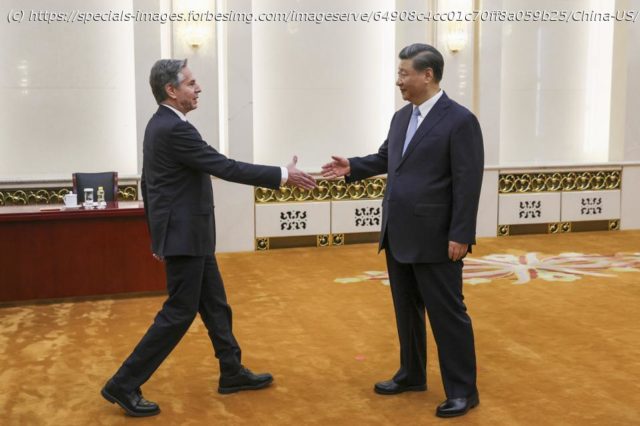Both countries use social media to message global audience
U.S. Secretary of State Antony Blinken in Beijing on Monday was able to get a much sought-after meeting with Chinese President Xi Jinping aimed at lowering a wide range of tensions between two of the world’s most powerful nations.
The short length of the visit, however, suggested that the substance was largely perfunctory. “Diplomatic drive-by?” asked long-time Morgan Stanley Asia executive and current Yale Law School’s Paul Tsai Center China Center fellow Stephen Roach in a Tweet.
“Blinken-Xi met for only 35 minutes— one of the shortest high-level meetings on record. Consecutive translation cuts the actual exchange in half — leaving each less than 10 minutes of perfunctory speaking time,” Roach wrote.
Nonetheless, the meeting marked the highest level exchanges between the two governments since a pause earlier this year after the downing of a suspected Chinese spy balloon over the U.S. heartland in February created an uproar in Congress and set back momentum created by a meeting between President Biden and Xi in Bali last November.
Referring to the Biden-Xi meeting in Indonesia, a U.S. State Department spokesperson said today that “the two sides agreed to continue discussions on developing principles to guide the bilateral relationship, as discussed by President Biden and President Xi in Bali.”
Blinken’s meetings over two days with Xi, Director of the Communist Party Central Foreign Affairs Office Wang Yi, and State Councilor and Foreign Minister Qin Gang yielded “candid, substantive, and constructive discussions on key priorities in the bilateral relationship and on a range of global and regional issues,” the State Department’s Matthew Miller said in the statement.
Of particular interest to businesses, Blinken addressed China’s “unfair and nonmarket economic practices and recent actions against U.
Home
United States
USA — mix “Diplomatic Drive-By?” Blinken Gets Short Meeting With Xi As U. S. -China...






